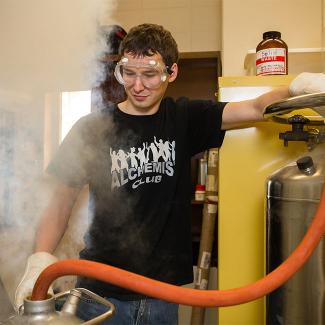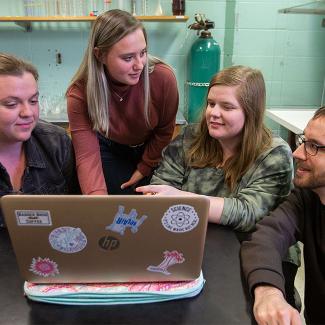What you'll learn studying Chemistry at UW-Platteville
In the UW-Platteville Department of Chemistry, you can explore your interests in chemistry, biochemistry, criminalistics, and related subjects. Chemistry is the study of all things chemical, which allows us to better understand how materials are structured, change, and react in certain situations. As a graduate, you will be prepared to apply your knowledge to our entire environment, working in a variety of career fields.
As you pursue your chemistry degree in Wisconsin, at UW-Platteville you’ll learn from award-winning faculty, take classes in state-of-the-art laboratories, and learn by discovering. We will connect you to excellent opportunities for co-ops and internships as a student, where you can learn skills that will help you land your first job after graduation. You will also build friendships with your classmates through small group study and project-based work.
Within the chemistry major, you can focus on your interests and tailor your degree for the career you want to pursue. We have two curricular options for pursuing the Bachelor of Science in Chemistry, as well as emphasis areas that align with each of the bachelor degree programs. You can choose from the standard chemistry curriculum, which provides a traditional focus on building chemistry knowledge, or the American Chemical Society certified curriculum, which provides a career-focused knowledge base.
Careers in Chemistry
Professionals who work in the field of chemistry research a variety of chemical substances, conduct experiments, and measure and evaluate how chemical compounds react. There are several disciplines that fall under the chemistry category, including biochemistry, neurochemistry, theoretical chemistry, forensic chemistry, and nuclear chemistry.
Earning a chemistry bachelor’s degree or earning a minor in chemistry with a different major can lead to a variety of rewarding careers. Graduates leave UW-Platteville with the knowledge and skills needed to pursue these roles and more:
- Chemical technician
- Analytical chemist
- Pharmacologist
- Organic chemist
- Synthetic chemist
- Geochemist
- Forensic science technician
- Toxicologist
- Chemical engineer
- Chemistry teacher
Chemists may work alone, but often work on research teams with other chemists. In most cases, chemists work indoors in controlled laboratory settings. You can find chemists in the public sector, working for government agencies, as well as in private companies.
Degree Options
Chemistry Major, Standard
The chemistry standard curriculum provides a traditional background in chemistry education, including coursework in general chemistry, quantitative analysis, organic chemistry, and inorganic chemistry. You will have exciting opportunities to engage in research and gain field experience. The curriculum offers a thorough knowledge of the major fields of chemistry, covering the general areas of inorganic, organic and physical chemistry, plus specialized chemistry coursework, including analytical and biochemistry.
View the degree requirements.
Chemistry Major, ACS Certified
The ACS-certified chemistry curriculum is designed to equip you with the necessary knowledge and skills to help ensure meaningful employment in industrial or governmental laboratories, or to enter graduate or professional school. Some companies offer higher starting salaries to certified degree holders. If you expect to enter a graduate program in chemistry, it’s recommended that you choose the ACS-certified chemistry degree.
View the degree requirements.
Biochemistry Emphasis, ACS Certified
The ACS-certified biochemistry emphasis area will teach combined knowledge of chemistry, biology, and biochemistry. Coursework will include focusing on organic chemistry, quantitative analysis, as well as microbiology, genetics, cell biology, and biochemistry labs.
You will study the molecules and chemical reactions found in life. The defining feature of biochemistry is that it uses principles of chemistry to explain biology at the molecular level. Through this area of emphasis, you will gain a better understanding of many central processes of life, including the structure of DNA and the flow of information, the unraveling of central metabolic pathways, and the structure and function of many proteins. You will also learn about the molecular causes of many diseases.
View the degree requirements.
Biochemistry and Biotechnology Emphasis, Standard
The biochemistry and biotechnology emphasis area is offered in collaboration with Madison College. Through this program, you will earn a bachelor of science degree in chemistry, and a postbaccalaureate certificate in biotechnology.
Careers in health fields are still abundant, especially as new data leads to better diagnosis and treatment. An undergraduate degree in chemistry with a biochemistry and biotechnology emphasis can prepare you for opportunities in human medicine, veterinary medicine, pharmacy, and dentistry, as well as give you the necessary background to prepare for a graduate program.
View the degree requirements.
Forensic Chemistry Emphasis, ACS Certified
The ACS-certified forensic chemistry emphasis serves as a basis for understanding primary forensic chemistry concepts, such as controlled substance identification, trace evidence analysis, and toxicology. The rigor of this degree is excellent preparation for careers in the industry, graduate school studies, and professional school.
For this emphasis area, coursework includes learning the fundamentals of criminal justice, crime scene investigation, evidence collection and preservation, and forensic chemistry. You will also participate in an internship as part of your degree program.
View the degree requirements.
Forensic Chemistry with DNA Emphasis
Placement of UW-Platteville forensic chemistry graduates in crime laboratories, the chemical industry, and graduate schools has been effectively 100% for the last 20 years. Essentially, forensic chemists are laboratory scientists who characterize trace evidence associated with a crime. Most of the country’s 40,000 police agencies require analysis by forensic chemists.
Through this emphasis area, you will gain an understanding of the DNA techniques that play an important role in forensic science. A forensic scientist with a degree based in chemistry represents one of the most sought-after backgrounds in criminalistics. The American Academy of Crime Lab Directors requires criminalists working in DNA units hold a bachelor of science degree, as well as specific coursework in statistics, genetics, molecular biology, and biochemistry.
Our curriculum will prepare you with hands-on experience using techniques and instruments found in today’s crime laboratory, including chromatographic techniques used in drug and arson residue analysis; trace analysis using a variety of techniques; and genetic analysis using electrophoretic techniques.
View the degree requirements.
Health Science Emphasis
The Health Science Emphasis lays the groundwork for understanding foundational principles related to health care professions. The multidisciplinary mix of courses will provide excellent preparation for careers in the field, graduate school studies, and professional programs including medical and dental schools.
In addition to a chemistry major, the coursework for this emphasis includes learning the fundamentals of biology, human anatomy and physiology, and genetics.
View the degree requirements.

More than Memorization
At UW-Platteville, chemistry undergraduate students learn in the classroom and through numerous other opportunities, including research, internships, and events offered through the university. These opportunities are available whether you are pursuing a bachelor’s degree in chemistry or a chemistry minor.


